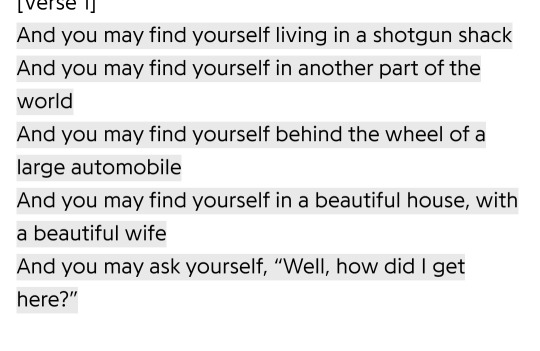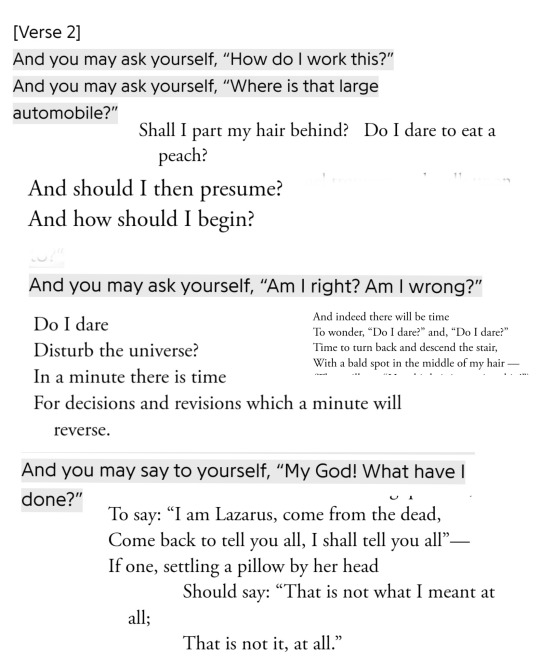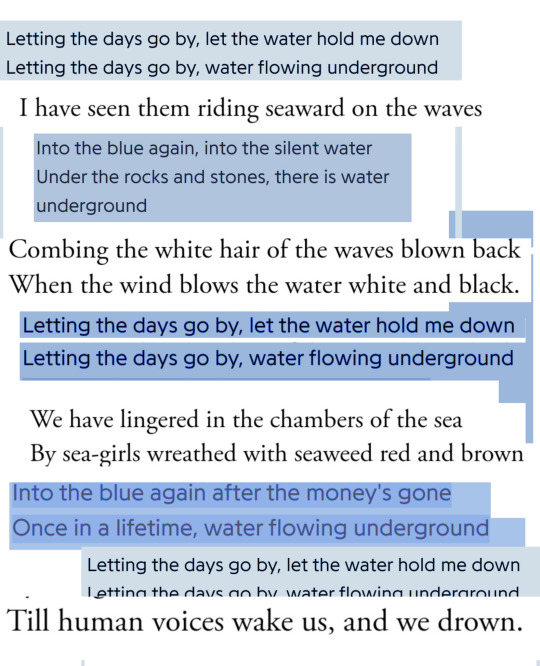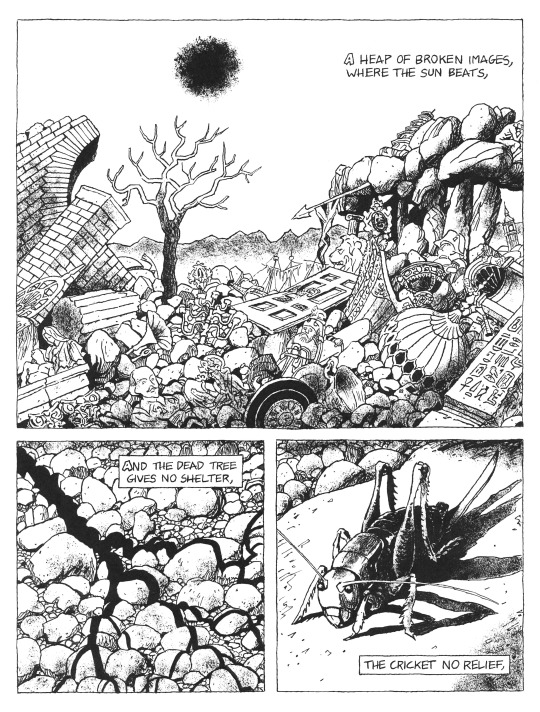#The Love Song of J. Alfred Prufrock
Explore tagged Tumblr posts
Text

In the room the women come and go Talking of Michelangelo.
T.S. Eliot, The Love Song of J. Alfred Prufrock
#literature#dark academia#academia#light academia#bookblr#quote#literary quote#poem#literary#t.s. eliot#the love song of j. alfred prufrock#book aesthetic
32 notes
·
View notes
Text

T. S. Eliot, from "The Love Song of J. Alfred Prufrock" (1915)
57 notes
·
View notes
Text


My Chemical Romance - The Jetset Life is Gonna Kill You / T.S. Eliot - The Love Song of J. Alfred Prufrock
#when women want to study me like a bug in a jar <3#my chemical romance#mcr#gerard way#mcr lyrics#the love song of j. alfred prufrock#ts eliot#poetry#comparitives#the jetset life is gonna kill you#three cheers for sweet revenge
47 notes
·
View notes
Text
I don’t want a hot girl summer I want a Prufrock summer:
- Wear white flannel trousers
- Walk upon the beach
- Part my hair behind (maybe)
- Eat a peach (if daring enough)
- Become a pair of ragged claws scuttling across the floors of silent seas
7 notes
·
View notes
Text
"The Waste Land" by T. S. Eliot, page 1
Ever since completing my comics adaptation of T. S. Eliot’s “The Love Song of J. Alfred Prufrock,” I have wanted to do something similar with Eliot’s most famous and celebrated poem, “The Waste Land.” But besides being extremely complex and often difficult to interpret,”The Waste Land” (First published 1922) is very long, and this always deterred me from getting started. It was only recently that…

View On WordPress
#april is the crellest month#comic#comics adaptation#cruelest month#fisher king#lilacs#poetry#poetry comics#T. S. Eliot#the burial of the dead#the hanged man#the love song of j. alfred prufrock#the waste land#World War One
17 notes
·
View notes
Text










I really can't quite explain it, but I think "Once in a lifetime" by the Talking Heads and The Love Song Of J. Alfred Prufrock (by T.S. Elliott) really are about the same thing. Things. I'm very normal about these pieces.
#webweaving#david bryne#talking heads#once in a lifetime#the love song of j. alfred prufrock#prufrock#prufrockposting#t.s. elliot#poetry#comparisons#parallels#modernism#idk man. ok. look at my v mentally stable posts boy#my edits
105 notes
·
View notes
Text

Excerpt from The Love Song of J. Alfred Prufrock by T. S. Eliot
#alliwanttodoiscollectpoetry#poem#poetry#poems#poet#poets#anthology#tumblr poetry#poem of the day#poetry blog#poemblr#poetblr#t. s. eliot#Eliot#literature#book worm#The Love Song of J. Alfred Prufrock#future#the multiverse#regret#the past
18 notes
·
View notes
Text
The Love Song of J. Alfred Prufrock - T.S. Eliot - USA
S’io credesse che mia risposta fosse A persona che mai tornasse al mondo, Questa fiamma staria senza piu scosse. Ma percioche giammai di questo fondo Non torno vivo alcun, s’i’odo il vero, Senza tema d’infamia ti rispondo.
Let us go then, you and I,
When the evening is spread out against the sky
Like a patient etherized upon a table;
Let us go, through certain half-deserted streets,
The muttering retreats
Of restless nights in one-night cheap hotels
And sawdust restaurants with oyster-shells:
Streets that follow like a tedious argument
Of insidious intent
To lead you to an overwhelming question ...
Oh, do not ask, “What is it?”
Let us go and make our visit.
In the room the women come and go
Talking of Michelangelo.
The yellow fog that rubs its back upon the window-panes,
The yellow smoke that rubs its muzzle on the window-panes,
Licked its tongue into the corners of the evening,
Lingered upon the pools that stand in drains,
Let fall upon its back the soot that falls from chimneys,
Slipped by the terrace, made a sudden leap,
And seeing that it was a soft October night,
Curled once about the house, and fell asleep.
And indeed there will be time
For the yellow smoke that slides along the street,
Rubbing its back upon the window-panes;
There will be time, there will be time
To prepare a face to meet the faces that you meet;
There will be time to murder and create,
And time for all the works and days of hands
That lift and drop a question on your plate;
Time for you and time for me,
And time yet for a hundred indecisions,
And for a hundred visions and revisions,
Before the taking of a toast and tea.
In the room the women come and go
Talking of Michelangelo.
And indeed there will be time
To wonder, “Do I dare?” and, “Do I dare?”
Time to turn back and descend the stair,
With a bald spot in the middle of my hair —
(They will say: “How his hair is growing thin!”)
My morning coat, my collar mounting firmly to the chin,
My necktie rich and modest, but asserted by a simple pin —
(They will say: “But how his arms and legs are thin!”)
Do I dare
Disturb the universe?
In a minute there is time
For decisions and revisions which a minute will reverse.
For I have known them all already, known them all:
Have known the evenings, mornings, afternoons,
I have measured out my life with coffee spoons;
I know the voices dying with a dying fall
Beneath the music from a farther room.
So how should I presume?
And I have known the eyes already, known them all—
The eyes that fix you in a formulated phrase,
And when I am formulated, sprawling on a pin,
When I am pinned and wriggling on the wall,
Then how should I begin
To spit out all the butt-ends of my days and ways?
And how should I presume?
And I have known the arms already, known them all—
Arms that are braceleted and white and bare
(But in the lamplight, downed with light brown hair!)
Is it perfume from a dress
That makes me so digress?
Arms that lie along a table, or wrap about a shawl.
And should I then presume?
And how should I begin?
Shall I say, I have gone at dusk through narrow streets
And watched the smoke that rises from the pipes
Of lonely men in shirt-sleeves, leaning out of windows? ...
I should have been a pair of ragged claws
Scuttling across the floors of silent seas.
And the afternoon, the evening, sleeps so peacefully!
Smoothed by long fingers,
Asleep ... tired ... or it malingers,
Stretched on the floor, here beside you and me.
Should I, after tea and cakes and ices,
Have the strength to force the moment to its crisis?
But though I have wept and fasted, wept and prayed,
Though I have seen my head (grown slightly bald) brought in upon a platter,
I am no prophet — and here’s no great matter;
I have seen the moment of my greatness flicker,
And I have seen the eternal Footman hold my coat, and snicker,
And in short, I was afraid.
And would it have been worth it, after all,
After the cups, the marmalade, the tea,
Among the porcelain, among some talk of you and me,
Would it have been worth while,
To have bitten off the matter with a smile,
To have squeezed the universe into a ball
To roll it towards some overwhelming question,
To say: “I am Lazarus, come from the dead,
Come back to tell you all, I shall tell you all”—
If one, settling a pillow by her head
Should say: “That is not what I meant at all;
That is not it, at all.”
And would it have been worth it, after all,
Would it have been worth while,
After the sunsets and the dooryards and the sprinkled streets,
After the novels, after the teacups, after the skirts that trail along the floor—
And this, and so much more?—
It is impossible to say just what I mean!
But as if a magic lantern threw the nerves in patterns on a screen:
Would it have been worth while
If one, settling a pillow or throwing off a shawl,
And turning toward the window, should say:
“That is not it at all,
That is not what I meant, at all.”
No! I am not Prince Hamlet, nor was meant to be;
Am an attendant lord, one that will do
To swell a progress, start a scene or two,
Advise the prince; no doubt, an easy tool,
Deferential, glad to be of use,
Politic, cautious, and meticulous;
Full of high sentence, but a bit obtuse;
At times, indeed, almost ridiculous—
Almost, at times, the Fool.
I grow old ... I grow old ...
I shall wear the bottoms of my trousers rolled.
Shall I part my hair behind? Do I dare to eat a peach?
I shall wear white flannel trousers, and walk upon the beach.
I have heard the mermaids singing, each to each.
I do not think that they will sing to me.
I have seen them riding seaward on the waves
Combing the white hair of the waves blown back
When the wind blows the water white and black.
We have lingered in the chambers of the sea
By sea-girls wreathed with seaweed red and brown
Till human voices wake us, and we drown.
28 notes
·
View notes
Text

These stunning, elegant, older women depicted as mermaids :: The artist is Jonas Peterson
[Ana Del Castillo]
* * * *
Lucia: "Mommy can we talk about museums and buildings?" me: "Sure" Lucia: "How come I'm not a mermaid?"
[my niece Maggie]
+
“I have seen them riding seaward on the waves Combing the white hair of the waves blown back When the wind blows the water white and black. We have lingered in the chambers of the sea By sea-girls wreathed with seaweed red and brown Till human voices wake us, and we drown.” "I grow old ... I grow old ... I shall wear the bottoms of my trousers rolled.
Shall I part my hair behind? Do I dare to eat a peach? I shall wear white flannel trousers, and walk upon the beach. I have heard the mermaids singing, each to each."
― T.S. Eliot, The Love Song of J. Alfred Prufrock
#mermaids#Ana Del Castillo#Jonas Peterson#T.S. Eliot#The Love Song of J. Alfred Prufrock#poetry#poem#growing older#aging
26 notes
·
View notes
Text
And indeed there will be time For the yellow smoke that slides along the street, Rubbing its back upon the window-panes; There will be time, there will be time To prepare a face to meet the faces that you meet; There will be time to murder and create, And time for all the works and days of hands That lift and drop a question on your plate; Time for you and time for me, And time yet for a hundred indecisions, And for a hundred visions and revisions, Before the taking of toast and tea. ... And. indeed there will be time To wonder, "Do I dare?" and, "Do I dare?" Time to turn back and descend the stair, With a bald spot in the middle of my hair --- (They will say: "How his hair is growing thin!") My morning coat, my collar mounting firmly to the chin, My necktie rich and modest, but asserted by a simple pin --- (They will say: "But how his arms and legs are thin!") Do I dare Disturb the universe? In a minute there is time For decisions and revisions which a minute will reverse.
from The Love Song of J. Alfred Prufrock by T.S. Eliot
3 notes
·
View notes
Text
The Love Song of J. Alfred Prufrock By T.S. Eliot 11-01-2024
2 notes
·
View notes
Text

#random memes#spirit halloween memes#spirit halloween#ts eliot#the love song of j. alfred prufrock#halloween 2024#Halloween#poetry#poetry memes#literary memes
4 notes
·
View notes
Text
In Which I ...
In which I suggest that you read this poem from the perspective of Aziraphale, after refusing the Holy Water to Crowley in 1862. The indecision, self doubt, self deprecation, and general dissatisfaction with everything just rings so true.

The Love Song of J. Alfred Prufrock
BY T. S. ELIOT
S’io credesse che mia risposta fosse A persona che mai tornasse al mondo, Questa fiamma staria senza piu scosse. Ma percioche giammai di questo fondo Non torno vivo alcun, s’i’odo il vero, Senza tema d’infamia ti rispondo.
Let us go then, you and I,
When the evening is spread out against the sky
Like a patient etherized upon a table;
Let us go, through certain half-deserted streets,
The muttering retreats
Of restless nights in one-night cheap hotels
And sawdust restaurants with oyster-shells:
Streets that follow like a tedious argument
Of insidious intent
To lead you to an overwhelming question ...
Oh, do not ask, “What is it?”
Let us go and make our visit.
In the room the women come and go
Talking of Michelangelo.
The yellow fog that rubs its back upon the window-panes,
The yellow smoke that rubs its muzzle on the window-panes,
Licked its tongue into the corners of the evening,
Lingered upon the pools that stand in drains,
Let fall upon its back the soot that falls from chimneys,
Slipped by the terrace, made a sudden leap,
And seeing that it was a soft October night,
Curled once about the house, and fell asleep.
And indeed there will be time
For the yellow smoke that slides along the street,
Rubbing its back upon the window-panes;
There will be time, there will be time
To prepare a face to meet the faces that you meet;
There will be time to murder and create,
And time for all the works and days of hands
That lift and drop a question on your plate;
Time for you and time for me,
And time yet for a hundred indecisions,
And for a hundred visions and revisions,
Before the taking of a toast and tea.
In the room the women come and go
Talking of Michelangelo.
And indeed there will be time
To wonder, “Do I dare?” and, “Do I dare?”
Time to turn back and descend the stair,
With a bald spot in the middle of my hair —
(They will say: “How his hair is growing thin!”)
My morning coat, my collar mounting firmly to the chin,
My necktie rich and modest, but asserted by a simple pin —
(They will say: “But how his arms and legs are thin!”)
Do I dare
Disturb the universe?
In a minute there is time
For decisions and revisions which a minute will reverse.
For I have known them all already, known them all:
Have known the evenings, mornings, afternoons,
I have measured out my life with coffee spoons;
I know the voices dying with a dying fall
Beneath the music from a farther room.
So how should I presume?
And I have known the eyes already, known them all—
The eyes that fix you in a formulated phrase,
And when I am formulated, sprawling on a pin,
When I am pinned and wriggling on the wall,
Then how should I begin
To spit out all the butt-ends of my days and ways?
And how should I presume?
And I have known the arms already, known them all—
Arms that are braceleted and white and bare
(But in the lamplight, downed with light brown hair!)
Is it perfume from a dress
That makes me so digress?
Arms that lie along a table, or wrap about a shawl.
And should I then presume?
And how should I begin?
Shall I say, I have gone at dusk through narrow streets
And watched the smoke that rises from the pipes
Of lonely men in shirt-sleeves, leaning out of windows? ...
I should have been a pair of ragged claws
Scuttling across the floors of silent seas.
And the afternoon, the evening, sleeps so peacefully!
Smoothed by long fingers,
Asleep ... tired ... or it malingers,
Stretched on the floor, here beside you and me.
Should I, after tea and cakes and ices,
Have the strength to force the moment to its crisis?
But though I have wept and fasted, wept and prayed,
Though I have seen my head (grown slightly bald) brought in upon a platter,
I am no prophet — and here’s no great matter;
I have seen the moment of my greatness flicker,
And I have seen the eternal Footman hold my coat, and snicker,
And in short, I was afraid.
And would it have been worth it, after all,
After the cups, the marmalade, the tea,
Among the porcelain, among some talk of you and me,
Would it have been worth while,
To have bitten off the matter with a smile,
To have squeezed the universe into a ball
To roll it towards some overwhelming question,
To say: “I am Lazarus, come from the dead,
Come back to tell you all, I shall tell you all”—
If one, settling a pillow by her head
Should say: “That is not what I meant at all;
That is not it, at all.”
And would it have been worth it, after all,
Would it have been worth while,
After the sunsets and the dooryards and the sprinkled streets,
After the novels, after the teacups, after the skirts that trail along the floor—
And this, and so much more?—
It is impossible to say just what I mean!
But as if a magic lantern threw the nerves in patterns on a screen:
Would it have been worth while
If one, settling a pillow or throwing off a shawl,
And turning toward the window, should say:
“That is not it at all,
That is not what I meant, at all.”
No! I am not Prince Hamlet, nor was meant to be;
Am an attendant lord, one that will do
To swell a progress, start a scene or two,
Advise the prince; no doubt, an easy tool,
Deferential, glad to be of use,
Politic, cautious, and meticulous;
Full of high sentence, but a bit obtuse;
At times, indeed, almost ridiculous—
Almost, at times, the Fool.
I grow old ... I grow old ...
I shall wear the bottoms of my trousers rolled.
Shall I part my hair behind? Do I dare to eat a peach?
I shall wear white flannel trousers, and walk upon the beach.
I have heard the mermaids singing, each to each.
I do not think that they will sing to me.
I have seen them riding seaward on the waves
Combing the white hair of the waves blown back
When the wind blows the water white and black.
We have lingered in the chambers of the sea
By sea-girls wreathed with seaweed red and brown
Till human voices wake us, and we drown.
Source: Collected Poems 1909-1962 (1963)
#good omens#good omens 2#ineffable idiots#good omens meta#ineffable husbands#ineffable dumbasses#crowley#aziraphale#aziracrow#crowley x aziraphale#aziraphale x crowley#ts eliot#the love song of j. alfred prufrock#poetry
9 notes
·
View notes
Text
Let us go then, you and I,
When the evening is spread out against the sky
Like a patient etherised upon a table;
Let us go, through certain half-deserted streets,
The muttering retreats
Of restless nights in one-night cheap hotels
And sawdust restaurants with oyster-shells:
Streets that follow like a tedious argument
Of insidious intent
To lead you to an overwhelming question …
Oh, do not ask, “What is it?”
Let us go and make our visit.
In the room the women come and go
Talking of Michelangelo.
The Love Song Of J. Alfred Prufrock by T.S.Eliot
7 notes
·
View notes
Text
youtube
"The Love Song Of J. Alfred Prufrock" by T. S. Eliot ‖ Sir Anthony Hopkins (2024.01.14)
"Taking a stroll on this winter day in London. There’s something beautiful and melancholic about the light here at this time of year." Source: IG
Let us go then, you and I, When the evening is spread out against the sky Like a patient etherized upon a table; Let us go, through certain half-deserted streets, The muttering retreats Of restless nights in one-night cheap hotels And sawdust restaurants with oyster-shells: Streets that follow like a tedious argument Of insidious intent To lead you to an overwhelming question … Oh, do not ask, “What is it?” Let us go and make our visit. In the room the women come and go Talking of Michelangelo.
#The Love Song Of J. Alfred Prufrock#T. S. Eliot#Sir Anthony Hopkins#poem#poetry#p-isforpoetry#video#Youtube
7 notes
·
View notes
Text
"The Waste Land" by T. S. Eliot, page 6
Every week on this site, I will be publishing a new page from my ongoing comics adaptation of “The Burial of the Dead,” the first section of T. S. Eliot’s epochal poem “The Waste Land” (Click on image to enlarge). Most of the various “broken images” in the first panel make reference to other portions of “The Waste land” or to elements from my previous adaptation of Eliot’s “The Love Song of J.…

View On WordPress
#a heap of broken images#comics#cricket#poetry#poetry comics#T. S. Eliot#the burial of the dead#the love song of j. alfred prufrock#the waste land#where&039;s Waldo
7 notes
·
View notes